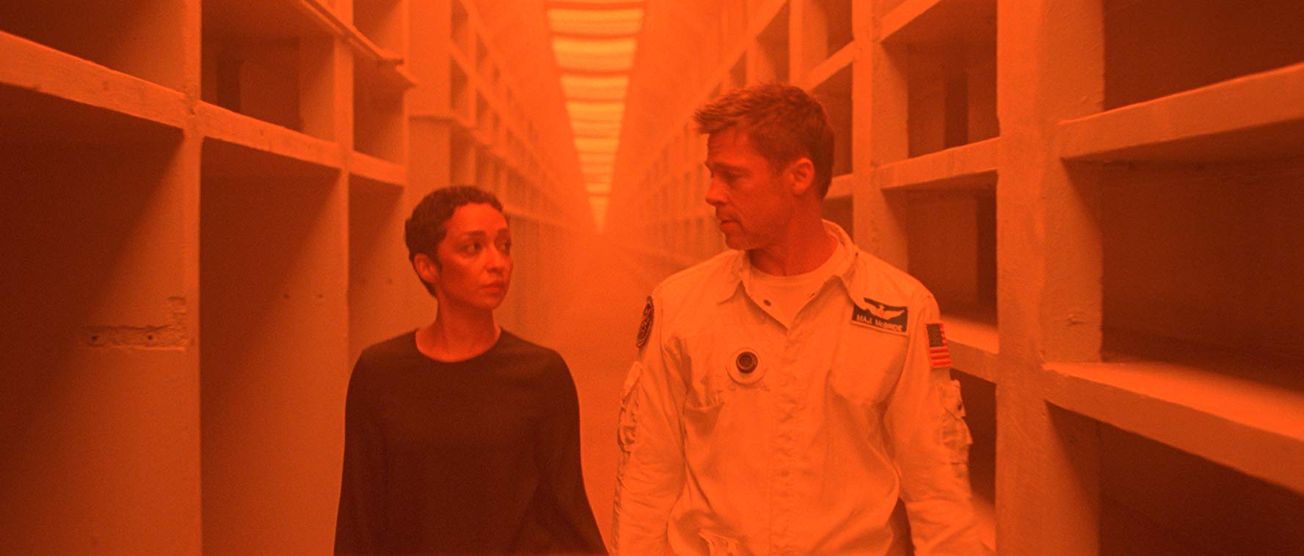By Louie Bell, Deputy Film & TV Editor
In Sci-Fi nowadays, it’s not easy to go where no film has gone before. Despite this, Director James Gray makes giant leaps with Ad Astra, an intelligent, masterfully-paced and visually-sumptuous sci-fi adventure that delivers an emotional and enticing story derived from Conrad’s Heart of Darkness.
Roy McBride (played by a superb Brad Pitt) is the son of decorated astronaut H. Clifford McBride (Tommy Lee Jones), an international hero who has been missing for 30 years in the far reaches of the solar system. Clifford had been head of the Lima project, an expedition designed to find evidence for intelligent life in the universe.
Following bizarre electrical surges that threaten the stability of society and life on earth that originated from the last known stop of the Lima Project, Roy is sent by the U.S. Government on a mission to send a personal message pleading to his father for any help in explaining the surges. The plot is simple, yet this is vital as director James Gray clearly doesn’t want to diverge much further from the father-son relationship which sits comfortably at the film’s heart.
Pitt’s performance as the emotionally-compartmentalised McBride carries the film, and is easily Pitt’s best recent performance. Reminiscent of Ryan Gosling’s Neil Armstrong in First Man (2018), the lack of surface emotion is the most poignant factor. Initially indifferent to the mission and chosen particularly for his lack of emotional connection to his father, Roy’s gradual unearthing of the truth begins to wear away at his mental state.
The visual effects are up there with the best I’ve seen in the last few years
Beautifully captured by frequent Nolan collaborator Hoyte Van Hoytema in glorious 35mm (who did such similarly striking work on 2014’s Interstellar), the visual effects are up there with the best I’ve seen in the last few years. They’re not overstated however, and contrary to point-and-look VFX styles, the visuals in Ad Astra are more reminiscent of 2017’s Blade Runner 2049; designed for maximum involvement in the story, without missing the spectacle needed for a high-budget sci-fi epic.
Shifting, shimmering visuals are complemented by Max Richter’s subtle score, importantly not falling into the trap of the notorious ‘Zimmer Effect’ consisting of enormous blasts of noise which unnecessarily undercut the emotion of the scene. Instead, emotionally-significant moments are kept strangely muted, inviting us to actually feel the emotional weight rather than listen out for it.
Finally saw AD ASTRA. Such a strange, beautiful, idiosyncratic journey around the simplest emotional core. I suspect it’s a movie that would wreck me on second viewing. An ideal major-studio bookend to HIGH LIFE, too.
— Scott Tobias (@scott_tobias) September 26, 2019
Like all space epics, the film will inevitably be held up to Star Wars (1977), Interstellar (2014) and Solaris (1971) for comparison, but a better comparison is to Apocalypse Now (1979), with McBride’s mysterious past and existential voiceover placing him in the Willard/Marlow role. I could almost hear Martin Sheen’s iconic cadence in Pitt’s voice, travelling on a dangerous journey to a point so far removed from human existence that its inhabitants are suspected to have gone insane. In addition, McBride’s growing angst and declining mental state parallels Willard’s musings on Kurtz: ‘What did he find out there…’
It’s not just the intertextuality and production that make Ad Astra a great watch. The story is enticing, with genuinely tense action sequences and crucially, the patience to explore ideas about humanity, fatherhood and obsession. Some critics have pointed out that some action-heavy sequences pull the film in another, more audience-friendly direction, but to me they’re vital to give the film the pace to keep the audience engaged in a way that other sci-fi epics simply don’t. Sorry Kubrick, but I was yawning after an hour of 2001 (1968).
The overall lack of key female characters raises questions about the genre’s overwhelmingly male-centric casting
The film isn’t without its flaws, Liv Tyler only gets roughly 30 seconds of screen time as Roy’s partner, and the overall lack of key female characters raises questions about the genre’s overwhelmingly male-centric casting and story-building. Ad Astra pushes interstellar boundaries, but clearly not social ones. It’s also slightly lazy towards the end, as aspects of the plot that would have seemed integral early on are brushed aside to make way for faster storytelling later on.
These issues can be overlooked however, as Ad Astra provides enough visual splendour to feast on, brilliant performances and above all the beautifully realised central story of one man’s journey outward in space to make contact with his father, in truth a journey inward to confront the demons of his mind.
Featured image: IMDb / 20th Century Fox
Do you think Ad Astra will go down as one of the great sci-fi films with its intense father-son drama?









